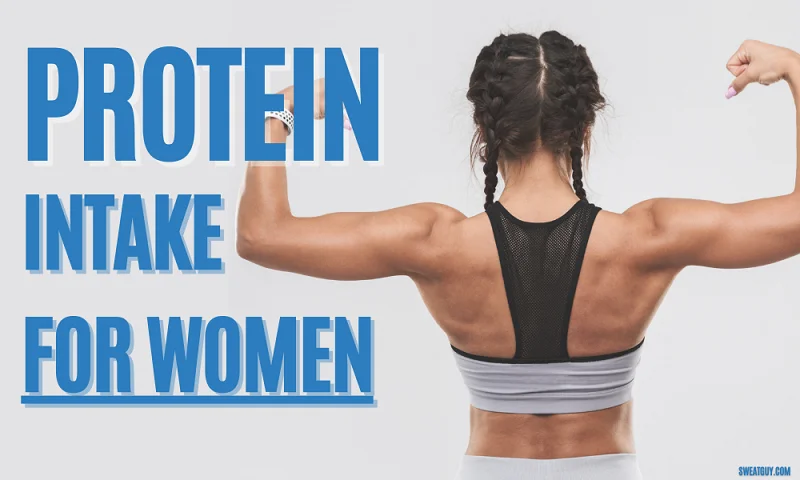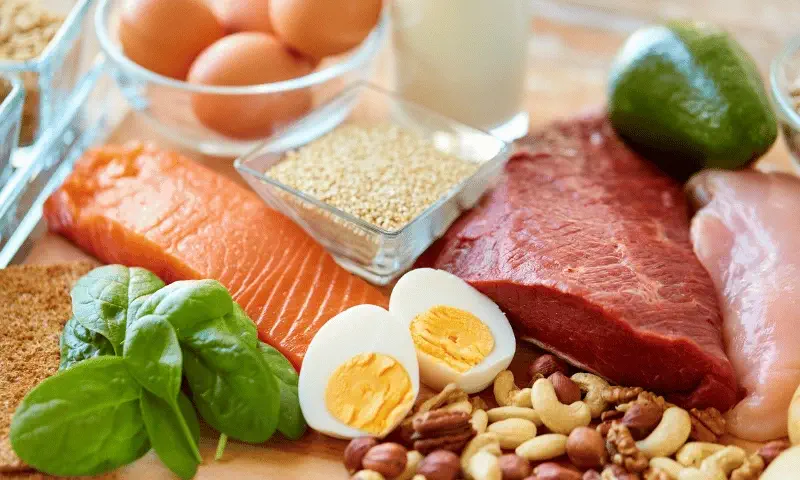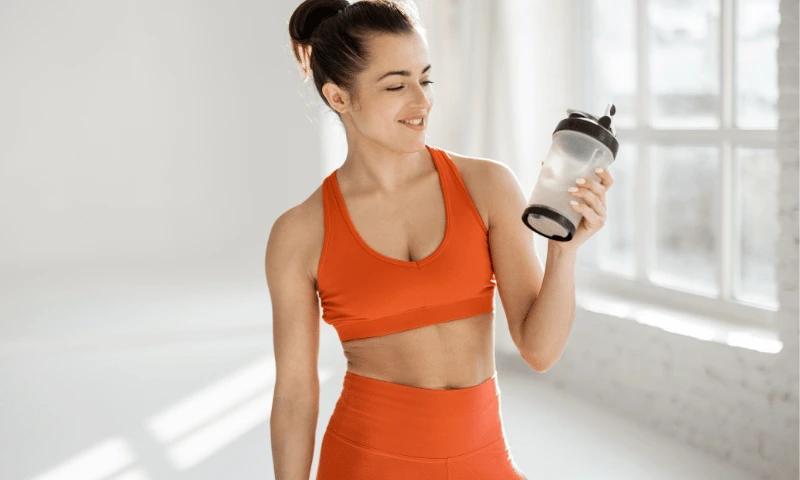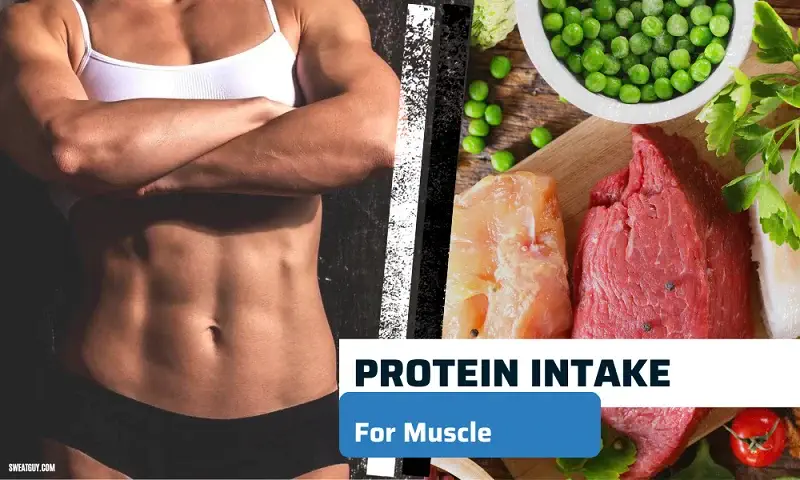Gone are the days when women were chasing a lean and skinny physique. Muscle Mommy is the new hype!
Easily digestible protein is the #1 muscle-building fuel a female needs to look toned, but how much protein should a woman eat to gain muscle often depends on multiple factors.
A woman’s age, weight, daily calorie intake, and even the level of physical activity she engages in affect the amount of protein her body requires.
The truth is—unlike fats and carbs, protein cannot be stored or reserved and does not cause unwanted fat storage in the body. So, when taken in the right amount, protein intake can show some real muscle growth for females.
So, what’s that sweet spot and how much protein a woman should eat to gain muscle?
First off, we need to figure out why and how the requirements of protein for both men and women are different.
Why are Protein Needs Different for a Woman?
Protein requirements can vary between males and females due to several physiological and metabolic differences.
Some of the considerable facts you must know about how much protein should a woman eat to gain muscle as compared to men include:
#1. Hormonal Differences
Hormones significantly impact the overall growth of muscle, and testosterone plays a key role. Naturally, the levels of testosterone in women as compared to men are low.
As per a study published in the Current Opinion in Clinical Nutrition and Metabolic Care, testosterone raises muscle protein synthesis and net muscle protein balance, which ends up affecting muscle gains in males.
On the contrary, ovarian hormones in females inhibit proper protein synthesis. This only goes to show the better position of men when it comes to anabolic hormones.
#2. Protein Breakdown
According to a Journal from the Current Opinion in Clinical Nutrition and Metabolic Care, the whole body protein synthesis or breakdown is different between genders. It’s the role of leucine to signal the availability of the amino acids that further support protein synthesis.
In Males and females, the leucine oxidation may be different during both rest and working hours.
#3. Menstrual Cycle
There are chances that women experience fluctuations in their hormones during the menstrual cycle. In-vitro and rat data suggest that ovarian hormones somehow inhibit muscle protein synthesis and cause random alterations.
So, females may need to consume more protein, particularly after the menstrual cycle. This is because, during the luteal phase of the menstrual cycle, it’s intended that their testosterone levels are higher.
#4. Activity Levels
While comparing the workout intensity of men and women, certainly there are huge differences in weights and reps.
Men often engage in higher-intensity workouts or physical activities that increase muscle protein breakdown and turnover. This eventually necessitates greater protein intake to support recovery and muscle growth.
So, when considering the workout intensity, women may not need as much protein as a man needs just to keep up with their activities. However, this might not apply to all women, especially females who lift weights professionally or are into bodybuilding.
Till now we configured that yes the difference between protein intake between men and women is indeed different. So, how much protein a woman needs to eat to gain muscle? Let’s find out.
How Much Protein Should a Woman Eat to Gain Muscle?

As we’ve found, protein essentially plays a significant role in building muscle mass in both men and women. However, their dosage quite differs and people often ask how much protein a woman should eat to gain muscle.
The basic outline for women’s protein intake is 0.8 grams per kilogram of body weight per day. Recommendations regarding athletes, 0.25 g of a high-quality protein per kg of body weight, or an absolute dose of 20–40 g will be considerable.
Women with 130 pounds of weight should prefer 52 grams of protein each day to maintain their daily protein intake.
However, as per the Journal of the International Society of Sports Nutrition, women who eat 1.6 grams of protein per kilogram of body weight each day will significantly notice changes in their muscle growth.
So, kickstart your journey to be a muscle mommy and flex your physique by adding some protein nutrition to the diet.
After all, what’s better than Muscle Meets Grace to empower women in fitness?
Now, one thing that’s still left is
Do Women Need More Protein than Men to Build Muscle?
No, they don’t. As per women’s physiological differences, they do not need more protein than men.
However, sometimes, it may be possible that a specific group of women who are active in bodybuilding takes more protein than average men.
But when both are into bodybuilding, females tend to have lower protein requirements due to their lower body weight as compared to male competitors.
As a rough estimate, a 7-day meal plan for muscle gain for females, in the case of a 60 kg woman, needs to be approximately 336 grams of protein each week.
Women and Protein – Why Getting Enough is Essential?

Protein is crucial for muscle growth and maintenance in both men and women, but it’s particularly important for women who want to build and maintain muscle.
Here are some of the factors why getting enough protein is essential in women.
#1. Protein Builds Lean Muscle Mass
As protein is high in amino acids, it helps in building muscle mass more rapidly. Further, it’s a critical nutrient for your body to employ muscle-building benefits.
So, if you’re wondering “how much protein women need per day to gain muscle”, well it may also depend on the needed approach and body goals. Usually, 0.8-1.0 grams per body weight will be optimum.
#2. Body Weight Management
Optimum levels of protein in the body also help women in better weight management. It promotes satiety and helps maintain a healthy and fit body. Having a protein-rich meal helps in fighting hunger cues to promote better satiety for effective weight loss.
A 2021 study found that obese women who ate a high-protein diet lost more weight and had greater reductions in body mass index and waist circumference than those who ate a low-protein diet.
#3. Supporting Bones, Hair, and Nails
While protein is essential for muscles, it also plays a role in bone health.
Strong muscles support bone health, reducing the risk of osteoporosis and fractures, which can be of particular concern for women as they age. Further, better protein distribution in the body also helps in maintaining hair and nails.
#4. Support Muscle Recovery
Consuming protein after a workout delivers sufficient amino acids needed for repairing and rebuilding injured muscle. Further, it aids in the development of muscles and the repair of muscle fibers too.
Instant muscle recovery eventually helps you push more during a workout and actively helps you be consistent in training.
#5. Burns Fat
Proper protein intake shows some impressive benefits for weight loss. It helps in burning off excess calories and boosting fat loss naturally.
Protein promotes lean muscle mass, so considering it for building muscle will definitely help you cut down the excess fat without any other effort.
Consuming a high-protein diet for muscle gain also leads to a well-sculpted physique by incinerating fat from the body.
Surely, here you’ve got the answer of how much protein to build muscle and lose fat a woman needs and the significant way to consume it.
But do you have any idea how to choose the one best-suited source for you?
Tips to Choose the Best Protein Source

After knowing how much protein a woman should eat to gain muscle, you must be wondering how to get it.
Well, there are plenty of ways to include protein in the diet, but here we’ve listed some of the tips you need to know. These factors help you choose the best-suited protein source.
1. Keep Your Dietary Preferences in Check
Keeping your own dietary preference in check is one of the biggest factors when adding protein to the diet.
Most women are allergic to some foods like peanuts, so while considering the best protein source for oneself, consider knowing whether it’s suitable for you.
2. It is Better to Go with Lean Protein
Usually, lean proteins are low in saturated fat and calories. This implies that they can be a good source of essential amino acids, which are the building blocks of muscle tissue.
Choosing lean protein sources helps in attaining lean muscle mass without bulking up the body with additional fat.
3. High-Quality vs. Low-Quality Protein
If you’re relying on animal sources, the only mentionable difference between the high-quality and low-quality protein sources are:
High-Quality Protein:
- Contains all 9 essential amino acids
- High in Digestibility
- High in Bioavailability
High-quality proteins are basically the meat of those animals that are specially grown organically and are glass-fed.
Low-Quality Protein:
- Does not contain all essential amino acid
- Low in Digestibility
- Low in Bioavailability
Further, most industrially raised meats are processed and do not carry essential nutrients, which makes them low-quality protein.
4. Protein Powders, Shakes, and Bars
Some women always worry about how much protein to build muscle, and how to take it perfectly.
So, the most convenient source one can rely on is the available protein supplements, shakes, and bars. Usually, you can also make them at home by adding some natural protein sources to get the optimum amount of protein to build muscle.
5. Vegan or Non-Vegetarian
Although non-vegetarians can get all the essential amino acids from dairy and animal sources, when it comes to vegans, they need to rely entirely on plant sources. However, some of the superfoods for bodybuilding when it comes to vegans include nuts, seeds, beans, tofu, and lentils.
Well, non-vegetarians can go for any source like chickens, Turkey, Fish, Eggs, and Low-fat dairy products.
These are some of the common factors a woman needs to consider while incorporating any supplement. Also, ensure to check the protein calculator for better outcomes.
Why Should Women Avoid Protein Powders Made for Men?
Since the protein intake for both men and women is different, there are plenty of reasons why women should avoid protein powders that are exclusively made for men.
- It contains a higher amount of carbohydrates and fats along with protein
- The caloric content will be much higher than needed
- Protein content will also be much more than women need
- Women’s protein powders also combine ingredients like collagen, biotin, and iron, which may not be available in men’s protein powders.
However, apart from these considerations, you also need to follow some precautions along with the dosage to avoid negative impacts.
Precautions
There are chances that you may go overboard with daily dosage. Here are some of the circumstances you may face:
- Weight gain
- Constipation
- Bad breath
- Diarrhea
- Dehydration
These are some of the reasons why women should consume specifically women-oriented protein powders and avoid protein powders that are made for men.
Till now, you must have got the answer to the query about how much protein per kg to build muscle a woman needs.
Final Note
Now you know how essential protein intake is and why women should consume it to build muscle. Eating a diet that’s high in protein can help you gain muscle mass and lose body fat, especially if you are also exercising regularly.
Henceforth, protein plays a vital role in building muscle mass in women as well as in males.
Protein is satiating, which means that it helps you to feel full after eating. This can help you to eat less overall, which can also lead to weight loss and a lean physique.
When determining how much protein you should eat, consider your height and weight too, and follow the guidelines we have laid out in this blog.
Overdosage may sometimes lead to unwanted consequences over time. So, considering protein intake in optimum amounts leads to possible gains that sustain for a long time.
Don’t forget to spread the word and let your fellow woman know how much protein she should eat each day to gain muscle and get a toned body.
